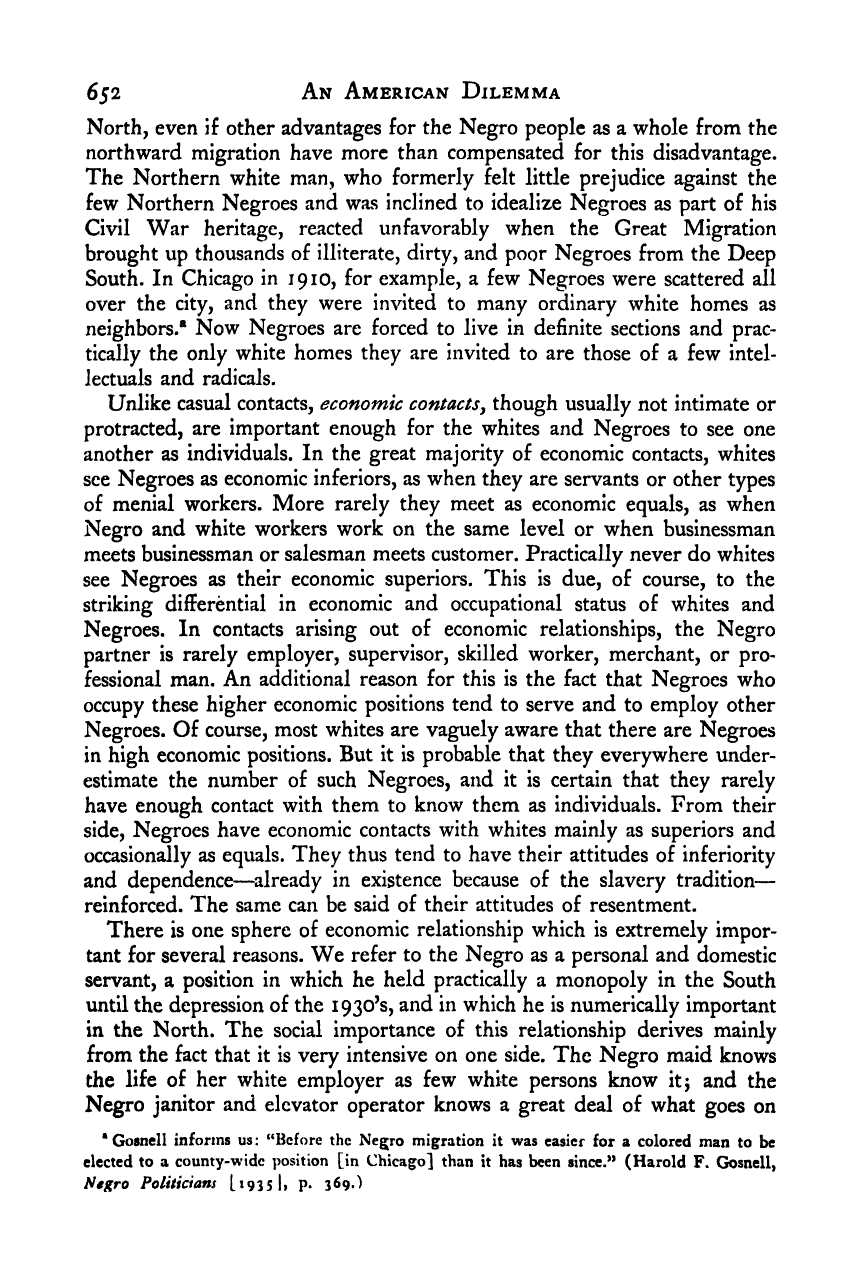Note: Gunnar Myrdal died in 1987, less than 70 years ago. Therefore, this work is protected by copyright, restricting your legal rights to reproduce it. However, you are welcome to view it on screen, as you do now. Read more about copyright.
Full resolution (TIFF) - On this page / på denna sida - VII. Social Inequality - 30. Effects of Social Inequality - 3. Interracial Contacts

<< prev. page << föreg. sida << >> nästa sida >> next page >>
Below is the raw OCR text
from the above scanned image.
Do you see an error? Proofread the page now!
Här nedan syns maskintolkade texten från faksimilbilden ovan.
Ser du något fel? Korrekturläs sidan nu!
This page has never been proofread. / Denna sida har aldrig korrekturlästs.
652 An American Dilemma
North, even if other advantages for the Negro people as a whole from the
northward migration have more than compensated for this disadvantage.
The Northern white man, who formerly felt little prejudice against the
few Northern Negroes and was inclined to idealize Negroes as part of his
Civil War heritage, reacted unfavorably when the Great Migration
brought up thousands of illiterate, dirty, and poor Negroes from the Deep
South. In Chicago in 1910, for example, a few Negroes were scattered all
over the city, and they were invited to many ordinary white homes as
neighbors.® Now Negroes are forced to live in definite sections and prac-
tically the only white homes they are invited to are those of a few intel-
lectuals and radicals.
Unlike casual contacts, economic contacts^ though usually not intimate or
protracted, are important enough for the whites and Negroes to see one
another as individuals. In the great majority of economic contacts, whites
see Negroes as economic inferiors, as when they are servants or other types
of menial workers. More rarely they meet as economic equals, as when
Negro and white workers work on the same level or when businessman
meets businessman or salesman meets customer. Practically never do whites
see Negroes as their economic superiors. This is due, of course, to the
striking differential in economic and occupational status of whites and
Negroes. In contacts arising out of economic relationships, the Negro
partner is rarely employer, supervisor, skilled worker, merchant, or pro-
fessional man. An additional reason for this is the fact that Negroes who
occupy these higher economic positions tend to serve and to employ other
Negroes. Of course, most whites are vaguely aware that there are Negroes
in high economic positions. But it is probable that they everywhere under-
estimate the number of such Negroes, and it is certain that they rarely
have enough contact with them to know them as individuals. From their
side, Negroes have economic contacts with whites mainly as superiors and
occasionally as equals. They thus tend to have their attitudes of inferiority
and dependence—already in existence because of the slavery tradition
—
reinforced. The same can be said of their attitudes of resentment.
There is one sphere of economic relationship which is extremely impor-
tant for several reasons. We refer to the Negro as a personal and domestic
servant, a position in which he held practically a monopoly in the South
until the depression of the 1930’s, and in which he is numerically important
in the North. The social importance of this relationship derives mainly
from the fact that it is very intensive on one side. The Negro maid knows
the life of her white employer as few white persons know itj and the
Negro janitor and elevator operator knows a great deal of what goes on
* Gosnell informs us: “Before the Negro migration it was easier for a colored man to be
elected to a county-wide position [in Chicago] than it has been since.” (Harold F. Gosnell,
Htgro Politicians [1935 1 » P- 369*^
<< prev. page << föreg. sida << >> nästa sida >> next page >>